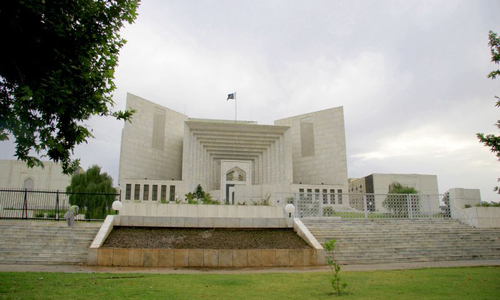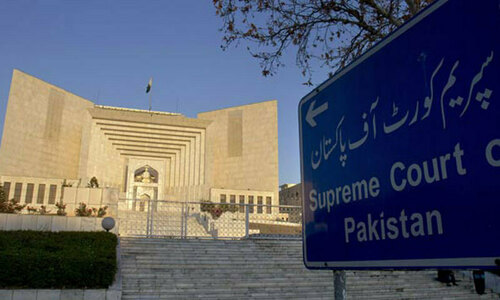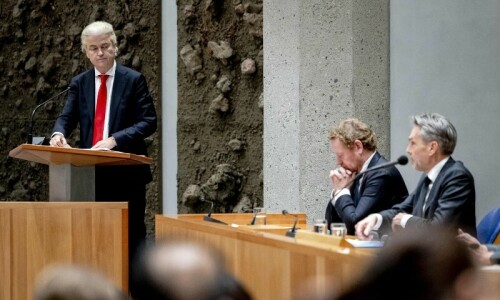• Rejects review pleas against Aug 17 verdict
• Dissenting Justice Mansoor urges judiciary to recognise central role of legislature
ISLAMABAD: The Supreme Court on Friday reinstated sacked government employees in their positions from Aug 17, causing the employees, who had gathered on Constitution Avenue, to heave a sigh of relief and disperse while raising slogans in favour of the judiciary.
With a majority of four to one, the five-judge bench threw away petitions seeking review of the Aug 17 judgement that had rendered almost 16,000 government employees jobless though it restored the employees with conditions.
On the eve of his retirement, Justice Mushir Alam on Aug 17 had declared as illegal and unconstitutional a PPP-era law called the Sacked Employees (Reinstatement) Ordinance Act 2010 (SERA) under which a number of people were employed or promoted.
However, Justice Syed Mansoor Ali Shah in his note of dissent accepted the petitions and reinstated the employees with certain conditions while emphasising that parliamentary sovereignty or legislative supremacy was the cornerstone of a strong democracy and therefore the judiciary must recognise the central role of the legislature.
The short order, the reasons of which will come later, was announced by Justice Umar Ata Bandial in a packed to capacity Courtroom No. 1.
Outside the Supreme Court premises a large number of the employees and their family members, including women and children, spent the previous chilly night in the hope that the dawn may herald some good news for them. And they took a sigh of relief when they were told about the verdict by their fellow members.
The majority judgement dismissed the petitions and held the Sacked Employees (Reinstatement) Act, 2010 to be violative of Article 25 (equality of citizens), 18 (that ensures freedom of trade, business or profession, 9 (security of person) and 4 (rights of individuals to be dealt with in accordance with the law) of the Constitution. “Thus the SERA is void under Article 8 (laws inconsistent with or in derogation of the fundamental rights to be void),” the short order said.
Invoking the original jurisdiction under Article 184(3) of the Constitution read with Article 187, the court while considering the services rendered by the reinstated employees held that the employees who were holding posts on the date of their initial termination of service -- from Nov 1, 1996 to Oct 12, 1999 -- did not require any aptitude, scholastic or skill test for appointment and they would be reinstated from the date of the judgement under review (Aug 17) in their posts on the same terms and conditions of service applicable on the date of their termination pursuant to the Aug 17 verdict.
Likewise, the employees who require the passing of any aptitude, scholastic or skill test for appointment will also be reinstated from Aug 17 in their posts on the same terms and conditions of service applicable on the date of their termination.
![ISLAMABAD: Some of the women employees greet each other after the Supreme Court ordered reinstatement of sacked government employees in their jobs on Friday. [Right] A group of jubilant employees celebrating the court’s verdict.—Online](https://i.dawn.com/primary/2021/12/61bd3c097d123.jpg)
The majority judgement however emphasised that any improvement in the terms and conditions of service of all the reinstated employees would be granted strictly in accordance with the laws and rules.
The short order made it clear that the relief of reinstatement will not be given to those employees whose were sacked on grounds of absence from duty, misconduct, corruption, misappropriation of money/stock or unfitness on medical grounds if such termination was not set aside finally by a court of law.
Meanwhile, in his note of dissent, Justice Mansoor Shah emphasised that the parliamentary sovereignty or legislative supremacy was the cornerstone of a strong democracy. “We must, therefore, recognize the central role of the legislature,” he observed adding that undermining the legislature undermined democracy.
Justice Shah observed that both the legislature and the judicature must play their role in the spirit of profound respect for each other and within the limits set out in the constitution. “The rule of law is not merely public order, it is social justice based on public order,” Justice Shah observed adding that the law existed to ensure proper social life by balancing the needs of the society and the individual and the courts must protect this rich concept of rule of law.
Under Article 8 of the Constitution, any law enacted by the legislature was void only to the extent it took away or abridged fundamental rights of the people, Justice Shah explained.
The minority judgement of Justice Shah accepted the review petitions and held as ultra vires Sections 4(a) and 10 of the SERA to the extent of reinstatement and regularisation on “one scale higher,” which gave an undue advantage to the reinstated employees to the detriment of the rights of the already working regular employees and thus violated their fundamental rights.
The provisions of these sections, except the words “one scale higher,” would however remain operative with effect from the date of enactment of the SERA and be read to mean the reinstatement and regularisation in the same or restructured scale, grade, cadre, group, post or designation, Justice Shah wrote.
According to the judgement, sections 2(f)(vi), 11, 12 and 13, which deal with and provide for reinstatement and regularisation of the sacked employees who had been dismissed from service on account of absence from duty, misconduct, misappropriation of government money or stock, or unfitness on medical grounds, and the determination of their guilt or medical unfitness attained finality by being unchallenged or unsuccessfully challenged. Such employees fall outside the class of sacked employees who suffered “political victimisation,” envisaged by the SERA for a beneficial treatment, and they by themselves do not constitute a distinct class having an intelligible differentia, which bears a reasonable relation to the object and purpose of the SERA.
All employees whose service was terminated on the basis of the judgement under review stand restored in the service with effect from the date they were so terminated and will be paid the pay of the intervening period treating the period as an extraordinary leave with pay.
The cases decided by the judgement under review, which now stands recalled, will be deemed pending and decided on their own merits by the regular benches of the Supreme Court in accordance with the provisions of the SERA.
Published in Dawn, December 18th, 2021

![ISLAMABAD: Some of the women employees greet each other after the Supreme Court ordered reinstatement of sacked government employees in their jobs on Friday. [Right] A group of jubilant employees celebrating the court’s verdict. — Online ISLAMABAD: Some of the women employees greet each other after the Supreme Court ordered reinstatement of sacked government employees in their jobs on Friday. [Right] A group of jubilant employees celebrating the court’s verdict. — Online](https://i.dawn.com/primary/2021/12/61bd3bea6c40c.jpg)










































